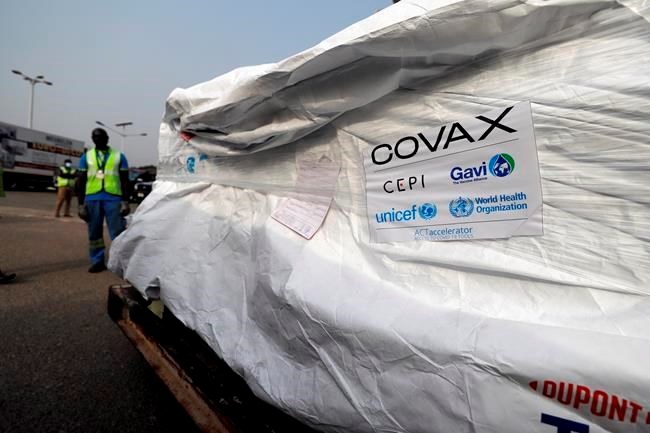OTTAWA — International Development Minister Karina Gould says the first injection of a COVID-19 vaccine in Ghana is a significant milestone for a new global vaccine-sharing program created to bring doses to low-income countries.
"This is the first time in history that such a mechanism has been created. And we've been huge supporters and champions of it," Gould said Wednesday in an interview.
But the NDP wants the House of Commons to censure the Canadian government for being the only G7 country to accept doses of the AstraZeneca vaccine through the program, known as COVAX, later this year.
Some 600,000 doses of the AstraZeneca vaccine arrived in the West African country of Ghana on Wednesday, months after the rollout of vaccines in Canada and the rest of the developed world, which has underscored the inequity COVAX was seeking to avoid.
COVAX was founded last year with the backing of the World Health Organization to bring vaccines to countries that can't afford them, and rich countries that have invested heavily in the program, such as Canada, are entitled to doses for their own domestic use.
NDP development critic Heather McPherson said Canada's decision to exercise its legal right to the COVAX doses highlights the fact the Liberal government has failed to guarantee enough of a domestic supply of vaccines.
McPherson said she will be pushing the Commons committee on foreign affairs and international development to allow her party's motion to be debated and voted on in the full Parliament.
"When rich countries who have already ordered 10 times more vaccines than they need start taking that supply, we know what the result is going to be,” said McPherson.
"We're going to be vaccinating healthy Canadians, well before the most vulnerable around the world."
Canada has pledged $220 million to COVAX and another $940 million to the ACT Accelerator, which tries to ensure low- and middle-income countries have equitable access to medical treatments during the pandemic.
But the government has also faced shortfalls in deliveries from the two major foreign biotech firms that it has secured orders with — Moderna and Pfizer-BioNTech. The AstraZeneca vaccine is still awaiting approval from Health Canada.
That has opened the government to criticism from opposition parties and others who argue Canada's lack of a domestic vaccine industry should have pushed the Liberals to do more.
The NDP motion states that "due to failures by the government to ensure adequate supply of vaccines for Canadians through national manufacturing and international procurement, Canada is the only G7 country accessing vaccines through COVAX, an initiative intended to provide vaccines to high risk individuals in low and middle income countries."
The motion goes on to say that the government's failure to secure an adequate vaccine supply for domestic use "makes Canadians more vulnerable to dangerous variants and extends the detrimental global economic impacts of COVID-19 by delaying vaccinations to high-risk people in poor countries."
Gould said that while she respects McPherson, who had a long career in international development before becoming an MP in 2019, she rejects the criticism inherent in the motion.
"She's very well versed in development issues and has a great background in this, but she is misframing," said Gould.
"COVAX was intentionally designed to have the buy-in from wealthier countries, both to try to ensure that there's equitable access, but also to increase the purchasing power of COVAX."
McPherson said none of that changes the fact that Canada has "dropped the ball" on domestic vaccine production while pre-purchasing enough doses to vaccinate the domestic population many times over.
"But none of them are coming as fast as we'd like," she said.
"It's really not even my NDP hat. It's my international development hat. This is my pre-life that's compelling me."
This report by The Canadian Press was first published Feb. 24, 2021.
Mike Blanchfield, The Canadian Press




